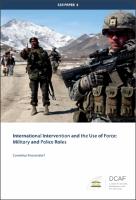International Intervention and the Use of Force
Military and Police Roles
Abstract
Intervening states apply different approaches to the use force in war-torn countries. Calibrating the use of force according to the situation on the ground requires a convergence of military and police roles: soldiers have to be able to scale down, and police officers to scale up their use of force. In practice, intervening states display widely differing abilities to demonstrate such versatility. This paper argues that these differences are shaped by how the domestic institutions of sending states mediate between demands for versatile force and their own intervention practices. It considers the use of force by Germany, Italy, the United Kingdom and the United States in three contexts of international intervention: Bosnia and Herzegovina, Kosovo and Afghanistan. The paper highlights quite different responses to security problems as varied as insurgency, terrorism, organised crime and riots. This analysis offers important lessons. Those planning and implementing international interventions should take into account differences in the use of force. At the same time, moving towards versatile force profoundly changes the characteristics of security forces and may increase their short-term risks. This difficulty points to a key message emerging from this paper: effective, sustainable support to states emerging from conflict will only be feasible if intervening states reform their own security policies and practices.
Keywords
security sector reform; good governance; democracy; intervention; use of force; versatile forceDOI
10.5334/bboISBN
9781911529316OCN
1078955207Publisher
Ubiquity PressPublisher website
https://www.ubiquitypress.com/Publication date and place
London, 2012Series
SSR Papers, 4Classification
Politics and government
Warfare and defence


 Download
Download